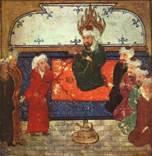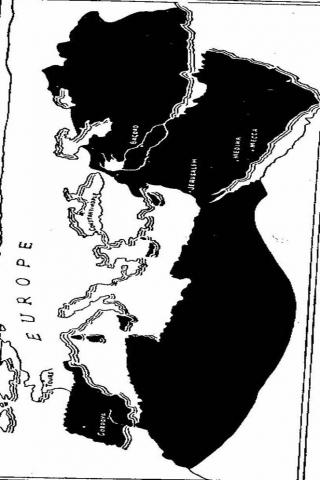Byzantine Age: Rise of Islam
WEEK 2: RISE OF ISLAM
Historical Background:
Review the history of the Arabic peoples. Remember the Old Testament patriarch, Abraham. The children of his first son, Ishmael, became the peoples of Arabia. They were a nomadic people, living in a desert environment. They did not worship the One God of Abraham, but a variety of primitive gods – stars, stones, trees, etc. The Arabic tribes were divided; there was no central leadership.
Small cities developed along caravan routes. The richest of these was Mecca, Medina the second. Jewish merchants and later Christian passed along these caravan routes. Thus some Meccan Arabs were exposed to the belief in One God. Find Mecca and Medina on your maps.
Mohammed:
In this world of the Arabs in northern Africa, a world of camels and deserts, there arose a new teacher. His name was Mohammed. Mohammed was born in the city of Mecca in 570 AD. He was just a poor camel driver, a servant of a wealthy Arabian lady. The lady fell in love with the servant and they were married. And for many years, the camel driver and his wife lived a quiet life in the town of Mecca. Then, when he was forty years old, Mohammed thought that an angel told him that h e should write a new book of teachings about a god he called Allah. He called his book the Koran. Mohammed did not believe that Jesus was the Son of God or that Jesus rose from the dead. In fact, Mohammed believed that he himself was greater and wiser than Jesus! His wife believed Mohammed and became his first follower.
e should write a new book of teachings about a god he called Allah. He called his book the Koran. Mohammed did not believe that Jesus was the Son of God or that Jesus rose from the dead. In fact, Mohammed believed that he himself was greater and wiser than Jesus! His wife believed Mohammed and became his first follower.
At first, the Arabic people laughed at Mohammed and plotted to get rid of Mohammed. But, Mohammed heard of the plot to kill him, and ran away with his wife and friends. He fled to the town of Medina. The word for “flight” in Arabic is “hegira”; his journey is called the “Hegira” by his followers to this day. For awhile Mohammed taught his new ideas in the city of Medina. In Medina, Mohammed won a large number of followers. He called his new religion Islam, meaning “submission”, and his followers were called Moslems, “those who submitted”. The first Moslem church, called a mosque, was built in Medina. Mohammed began a war on the caravans, intent on capturing Mecca and all Arabia. He returned to Mecca in 630 AD and made it the center of Islam.
Islamic Teachings:
The religious teachings of Islam are very simple:
- The belief in One God, called Allah, is imperative.
- Jesus was one in a line of prophets, extending back to the Old Testament, and culminating in himself, Mohammed.
- Prayer 5 times a day, facing Mecca, is compulsory, as is a trip at least once in a lifetime to Mecca.
- The final revelation of God is embodied in the Koran.
- Paradise awaited faithful believers after death, especially if they died in battle against non-believers.
- Giving alms to the poor is mandatory.
- Pork and alcohol are forbidden.
Islamic Conquests:
Mohammed was not content to have only the followers who liked his new teachings. And, with his teaching on Paradise, he had no shortage of men willing to die in battle against non-believers. They began to force people in Arabia and in other lands to become Moslems or die. Mohammed died, but his followers continued to fight wars to conquer lands for their new ideas. Mohammed had founded a religion that united the Arabian peoples as never before and fired them with fanatical zeal. The political map of the entire world was changed in less than 100 years. (See next page for map.)They conquered Persia easily, captured most of India, took all of northern Africa, overran Spain and continued on to France, conquering the Christian lands, until they were stopped in France by the great warrior, Charles the Hammer, at the Battle of Tours. They even conquered Jerusalem and the Holy Land where Jesus had taught and lived! Soon they were at the doorstep of Constantinople, the capital of the great Christian Byzantine Empire built by the Emperor Constantine 400 years before.
For many years the Arabic followers of Mohammed tried to conquer Constantinople. Battle after battle was fought. The people of Constantinople poured boiling oil on the attacking Moslems. Finally, Emperor Leo III defeated the Moslems in 717 AD and made them flee behind the mountains. They did not attack Constantinople again for hundreds of years. Christians were safe to worship the Lord in the lands of the Byzantine Empire again.
Moslem Empire:
Since Mohammed named no successor, at first a series of his associates succeeded him. Soon a new type of tribal government, the Caliphate, came into existence. Each Caliph ruled a city-state. The great Caliphates included Damascus, Baghdad, Cairo, and Tunisia. The entire Empire, like the Roman before it, was united by a single language, now Arabic, and a single religion, Islam. Christian Churches in the newly conquered countries had to deal with a different Empire, but, again, one that had conversion to Islam (instead of paganism) in mind for all its citizens. Christians who did not become Moslem were second-class citizens much of the time, and, in many Islamic countries, are to this day.
Discussion:
Look at the world of Islam today. Holy wars and conquest continues. The belief that a believer will go to Paradise if he dies killing unbelievers continues in the suicide bombings. What has changed? What has not? How should we as Christians react to these acts? What is happening today to Christians in Muslim lands?
Quiz Questions:
- Summarize the origin of the Arab peoples in 5 sentences.
- Summarize the life of Mohammed in 6 sentences.
- Summarize the teachings of Islam in 7 sentences.
- Summarize the conquests of the Moslems in the 7th century in 8 sentences.
